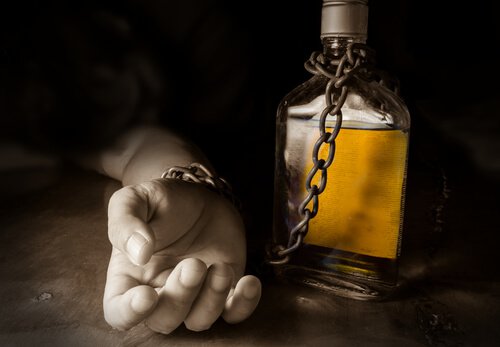The Thin Line Between Alcoholism and a Habit

Today, you have left the office and, like every other Friday afternoon. You have agreed to meet some friends for a drink. It’s your tradition, and it’s almost the only way you manage to keep in touch. However, this afternoon is different. One of your friends has news that surprises everyone, he has been diagnosed with alcoholism. Furthermore, this habit of meeting up every Friday for drinks is part of the problem.
This bomb shocks you and your friends. It makes you all think that it’s a joke. But, alas, it’s not. It’s a real problem and, unfortunately, a very common one. And also, it’s a very difficult one to understand. It’s difficult to understand because you also drink. You also go to those gatherings with your friends, and you also participate in this habit. Yet, you don’t suffer from alcoholism. You’re not an alcoholic. Or so you think…

Alcoholism or a habit?
Diagnostic classifications, such as the DSM-5, define alcohol consumption disorder as “a set of behavioral and physical symptoms, among which are withdrawal, tolerance and an intense desire to consume”.
Within the criteria, they emphasize the frequency and recurrent consumption of alcohol as an essential part of the diagnosis. But, can this recurrent consumption be considered a habit? According to the Royal Spanish Academy, we’ll take into account the word’s sixth definition. It defines a habit as “a situation of dependency towards certain drugs”.
But, is a habit in itself what really generates the addiction? The answer is no. An addiction, in the case of alcoholism, is an illness which develops due to different factors. These factors include psychological, social and biological aspects. It passes from a simple habit to abusive consumption. In turn, this consumption modifies the cerebral structure and behavior of the individual in question.
Which means, there is a mix of biological, social and behavioral factors that turns a habit into something more. It turns drinking with your friends into an addiction. And this is the most dangerous part, there are some factors that we control, and some we don’t. This makes it hard to predict who, if placed in the same situation, would develop an addiction and who wouldn’t.

Why do some people develop alcoholism and others don’t?
Then, why is it that within that group of friends we mentioned earlier, did one develop alcoholism and the rest didn’t? The factors that influence the development of an alcohol addiction can be summarized into:
Biological factors
The biological factors that aid in the development of alcoholism range from genetic inheritance to the alteration of different neurotransmitters and cerebral structures promoted by the habit of consumption, which in predisposed individuals produces an even quicker modification.
Alcohol consumption disorder is more easily found among relatives. 40-60% of the variance in the risk of suffering from alcoholism can be explained by genetic influences. Additionally, the risk is three to four times as high for the children of people with the disorder.
In regards to the cerebral functions and neurotransmitters, it has been proven that dopamine is involved in the beginning of addictions. This is because dopamine is associated with pleasure, as well as the so-called cerebral award system, composed mainly by the ventral tegmental area, among other structures.

Psychological factors
The perception that the very individual has of alcohol consumption and the use he gives it can be very important. If within the group of friends we mentioned earlier, the person that developed alcoholism tended to boast about being the one who could handle the most liquor, he probably drank a lot more than his friends.
Besides putting his own health in danger by generating a harmful habit, it stopped being controllable and become an addiction. Thus, their behavioral patterns during adolescence, which is when this type of conduct begins, are crucial. Their attitude towards the control and devaluation of the need of social validation are very important.
Social factors
The perception of drinking and the availability of alcohol in the society in which the individual is submerged are also very important factors. It has been proven that societies which are more permissive of alcohol consumption have higher levels of alcoholism.
Due to all of this, we must point out that there is a very thin line between a habit and alcoholism. In this line, there are factors within our control (behavior) and others which are not (biological risks). Thus, you have to be very careful and always consume alcohol in moderation. Or, better yet, avoid its consumption entirely.
Today, you have left the office and, like every other Friday afternoon. You have agreed to meet some friends for a drink. It’s your tradition, and it’s almost the only way you manage to keep in touch. However, this afternoon is different. One of your friends has news that surprises everyone, he has been diagnosed with alcoholism. Furthermore, this habit of meeting up every Friday for drinks is part of the problem.
This bomb shocks you and your friends. It makes you all think that it’s a joke. But, alas, it’s not. It’s a real problem and, unfortunately, a very common one. And also, it’s a very difficult one to understand. It’s difficult to understand because you also drink. You also go to those gatherings with your friends, and you also participate in this habit. Yet, you don’t suffer from alcoholism. You’re not an alcoholic. Or so you think…

Alcoholism or a habit?
Diagnostic classifications, such as the DSM-5, define alcohol consumption disorder as “a set of behavioral and physical symptoms, among which are withdrawal, tolerance and an intense desire to consume”.
Within the criteria, they emphasize the frequency and recurrent consumption of alcohol as an essential part of the diagnosis. But, can this recurrent consumption be considered a habit? According to the Royal Spanish Academy, we’ll take into account the word’s sixth definition. It defines a habit as “a situation of dependency towards certain drugs”.
But, is a habit in itself what really generates the addiction? The answer is no. An addiction, in the case of alcoholism, is an illness which develops due to different factors. These factors include psychological, social and biological aspects. It passes from a simple habit to abusive consumption. In turn, this consumption modifies the cerebral structure and behavior of the individual in question.
Which means, there is a mix of biological, social and behavioral factors that turns a habit into something more. It turns drinking with your friends into an addiction. And this is the most dangerous part, there are some factors that we control, and some we don’t. This makes it hard to predict who, if placed in the same situation, would develop an addiction and who wouldn’t.

Why do some people develop alcoholism and others don’t?
Then, why is it that within that group of friends we mentioned earlier, did one develop alcoholism and the rest didn’t? The factors that influence the development of an alcohol addiction can be summarized into:
Biological factors
The biological factors that aid in the development of alcoholism range from genetic inheritance to the alteration of different neurotransmitters and cerebral structures promoted by the habit of consumption, which in predisposed individuals produces an even quicker modification.
Alcohol consumption disorder is more easily found among relatives. 40-60% of the variance in the risk of suffering from alcoholism can be explained by genetic influences. Additionally, the risk is three to four times as high for the children of people with the disorder.
In regards to the cerebral functions and neurotransmitters, it has been proven that dopamine is involved in the beginning of addictions. This is because dopamine is associated with pleasure, as well as the so-called cerebral award system, composed mainly by the ventral tegmental area, among other structures.

Psychological factors
The perception that the very individual has of alcohol consumption and the use he gives it can be very important. If within the group of friends we mentioned earlier, the person that developed alcoholism tended to boast about being the one who could handle the most liquor, he probably drank a lot more than his friends.
Besides putting his own health in danger by generating a harmful habit, it stopped being controllable and become an addiction. Thus, their behavioral patterns during adolescence, which is when this type of conduct begins, are crucial. Their attitude towards the control and devaluation of the need of social validation are very important.
Social factors
The perception of drinking and the availability of alcohol in the society in which the individual is submerged are also very important factors. It has been proven that societies which are more permissive of alcohol consumption have higher levels of alcoholism.
Due to all of this, we must point out that there is a very thin line between a habit and alcoholism. In this line, there are factors within our control (behavior) and others which are not (biological risks). Thus, you have to be very careful and always consume alcohol in moderation. Or, better yet, avoid its consumption entirely.
This text is provided for informational purposes only and does not replace consultation with a professional. If in doubt, consult your specialist.







